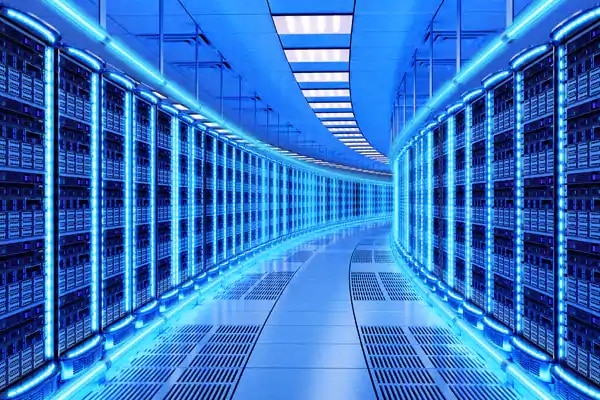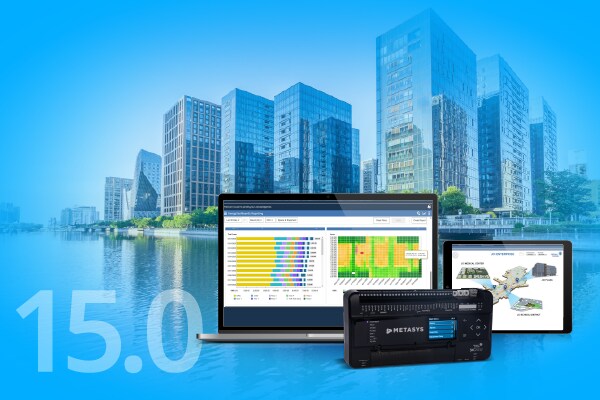- Johnson Controls
- Insights
- How Innovation and Sustainability in Data Centres can Benefit from Precision Environmental Control
How Innovation and Sustainability in Data Centres can Benefit from Precision Environmental Control
Across the country, demand for data processing, storage and security is growing rapidly. The UK is now home to more than 500 active data centres, with major developments underway in regions such as London, Manchester and the South East. These centres are not only essential for powering AI technologies and high-performance computing, but they also support national priorities around data sovereignty, sustainability and economic growth.
At Johnson Controls, we understand the critical importance of data centres to the UK’s future. Our solutions are designed to help operators optimise performance, improve energy efficiency and maintain the highest standards of safety and reliability. Whether you are building new facilities or upgrading existing ones, we are here to support your journey with smart, scalable and sustainable technologies.

In today’s hyper-connected society, where services are increasingly online and accessible around the clock, data centres have become the driving force behind digital innovation. From artificial intelligence and streaming platforms to e-commerce and financial services, these facilities underpin the technologies that shape everyday life.
As the foundation of our digital infrastructure, data centres manage vast volumes of client data, deliver hosting capabilities and provide the computing power needed to automate essential tasks. To do this effectively, they must offer seamless access while also working to reduce their environmental impact.
Modern data centres face the challenge of balancing operational performance with sustainability. To protect the integrity of hosted data, extend the lifespan of critical infrastructure and meet rigorous regulatory standards, operators must focus on three key priorities:
Environmental control:
The heat produced by densely packed server racks must be carefully managed to meet — and ideally exceed — manufacturer specifications and industry best practice.
Operational uptime:
With continuous data availability now expected as standard, the correct design and deployment of cooling systems is vital to ensure uninterrupted service.
Regulatory compliance and cost efficiency:
As data centres continue to expand across the UK and globally, energy efficiency and cost control have become central concerns for operators, clients and regulators alike.
With over 140 years of experience in environmental controls and a global distribution network touching every continent, Johnson Controls stands as a prime example of excellence in the field of environmental control systems.
A Closer Look at These Data Centre Priorities
The Importance of Environmental Control
Data centres are complex environments that rely on precise conditions to function effectively. One of the most pressing challenges is managing heat. Server racks generate significant thermal energy, and without proper cooling, this can lead to equipment failure, reduced lifespan and costly service disruptions.
Temperature fluctuations pose a serious risk, potentially causing unplanned downtime and expensive repairs. Humidity control is equally important. Excess moisture can lead to condensation, while overly dry conditions may result in static electricity, which threatens sensitive electronics.
Pressure regulation also plays a key role. Inconsistent pressure can reduce cooling efficiency and disrupt airflow, creating hotspots that compromise performance.
To tackle these issues, data centres must deploy advanced HVAC systems with distributed cooling equipment. Continuous monitoring of air handling and cooling distribution units allows operators to maintain optimal temperature, humidity and pressure levels across the data hall.
Key environmental strategies include:
- Airflow optimisation: Ensuring consistent airflow to prevent overheating
- Precise temperature and humidity control: Maintaining stable conditions at each server
- Dynamic cooling distribution: Delivering cooling efficiently to all equipment
When these strategies are combined with proactive maintenance, data centres benefit from improved reliability, extended equipment life and reduced energy costs, all of which contribute to operational excellence.
Operational Uptime: A Critical Requirement
In the digital age, uninterrupted service is essential. Data Centres must be designed for resilience, with systems that ensure high availability even during unexpected failures.
Redundancy is key. By incorporating backup systems and failover mechanisms, operators can maintain service continuity under adverse conditions. Common approaches include:
- Dual cooling paths (2N): Independent systems that maintain stability if one fails
- Backup cooling systems (N+1, N+2): Extra capacity to support operations during disruptions
- Redundant servers (2N): Failover support for monitoring and control of critical infrastructure
These measures form the foundation of reliability. In a world where customers expect services to be available at all times, data centre operators must implement robust strategies to protect uptime and meet demanding service-level agreements.
Balancing Cost Management and Regulatory Compliance
With rising energy costs and increasingly strict environmental regulations, data centres face the dual challenge of managing expenses while remaining compliant.
Efficiency is no longer optional. Operators must optimise energy use and resource allocation to maintain performance without overspending. Regulatory compliance is equally vital, helping avoid penalties and ensuring long-term sustainability.
Building Automation Systems play a crucial role. These technologies help maintain temperature, humidity and pressure within required thresholds, supporting both compliance and operational efficiency.
Dashboards and reporting tools provide real-time insights into energy consumption and environmental conditions. Automated reporting simplifies audits and reduces administrative overhead, while trend analysis helps identify inefficiencies and opportunities for improvement.
By embracing smart systems and data-driven decision-making, operators can reduce costs, meet regulatory standards and maintain peak performance.
Shaping the Future Together
As data centres continue to grow in scale and complexity, the strategies that support them must evolve. Precision environmental control, intelligent automation, robust cybersecurity and scalable infrastructure will become even more important in the years ahead.
With over 140 years of experience in environmental systems and a global presence, Johnson Controls is a trusted partner in this journey. Our expertise in environmental management and real-time analytics helps clients enhance efficiency, reliability and sustainability across their data centre operations.
Contact us today to discuss your Data Centre requirements with one of our experts.






















.jpg?la=en&h=320&w=720&hash=244C75B74F0F77521D56164450973BCD)














.jpg?la=en&h=310&w=720&hash=8D9823F26AA80B2B75C3E4B2E61770DC)


.jpg?la=en&h=320&w=719&hash=13CA7E4AA3E453809B6726B561F2F4DD)
.jpg?la=en&h=306&w=720&hash=F21A7CD3C49EFBF4D41F00691D09AEAC)

.png?la=en&h=320&w=720&hash=18CFCCD916C92D922F600511FABD775D)


















